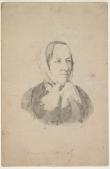Margaret Catchpole was born in Suffolk in 1762, reportedly the daughter of an unmarried woman, Elizabeth Catchpole, and a farm labourer. She was said to have grown up on the farms on which her father worked, and became highly skilled with horses. With little formal education, she entered service, and served as a cook and nurse for the family of John Cobbold, an Ipswich brewer.
After leaving the Cobbold family in 1795, Catchpole endured a period of illness and unemployment. In early 1797, she stole a horse from John Cobbold and rode it to London, apparently intending to sell it, but was caught. The incident, and subsequent trial, was widely reported in the press, as the feat of riding the 113 kilometres from Ipswich to London in ten hours was then regarded as an extraordinary one, especially for a woman. Originally sentenced to death, Catchpole's sentence was commuted to seven years transportation, though in fact she remained in Ipswich gaol for several years.
On March 25, 1800, Catchpole escaped from Ipswich gaol, using a clothes line to scale a wall over six meters high. The newspapers once again widely reported her daring physical feat, and her subsequent recapture in early April. Catchpole had apparently disguised herself as a sailor and "made for the Coast; in hopes of getting on board some smuggling vessel." In the later novelised account of Catchpole's life, her escape, and indeed her entire criminal career, is attributed to her involvement with one Will Laud, a notorious smuggler who is killed when Catchpole is recaptured. Laud and his dramatic death, however, are conspicuously absent from the original newspaper reports, and no reliable independent record of this "notorious smuggler" has yet been found.
Catchpole was again sentenced to death, and again had her sentence commuted: this time to transportation for life. She was sent to New South Wales on the Nile in 1801. For a time, Catchpole was assigned as a servant to John Palmer, the commissary of the settlement (for whom she worked as a cook), and she subsequently worked for other prominent families. Pardoned in January 1814, Catchpole opened a small shop in the Richmond district, where she died in 1819.
A series of letters written by Margaret Catchpole, written from New South Wales between 1802 an 1811, have survived: the surviving manuscripts are held at the Mitchell Library, State Library of New South Wales, the National Library of Australia, and the Ipswich Library. The letters, many of which are addressed to her Ipswich employer Mrs Cobbold, reveal a woman proud of her independent status in the colony.
 5833676696886885656.jpg
5833676696886885656.jpg
 5833676696886885656.jpg
5833676696886885656.jpg